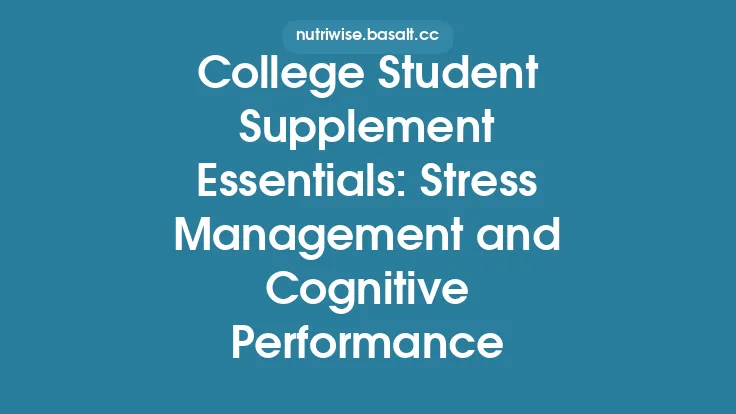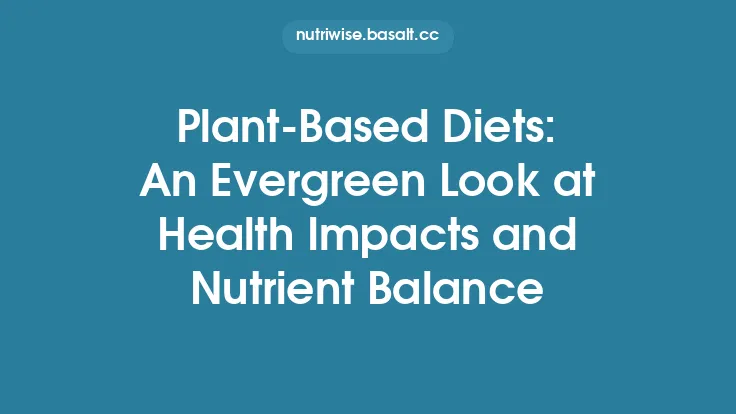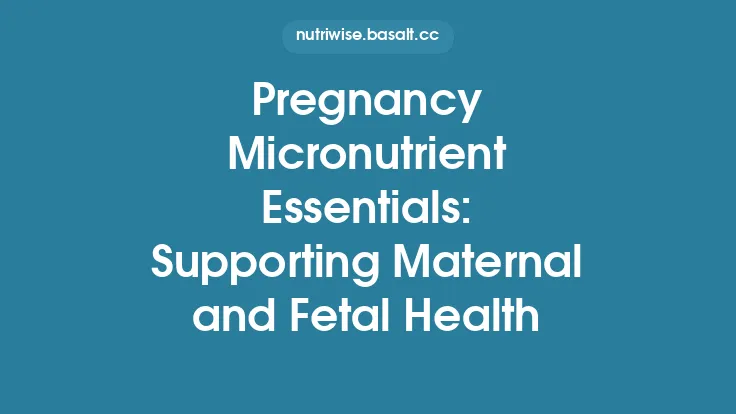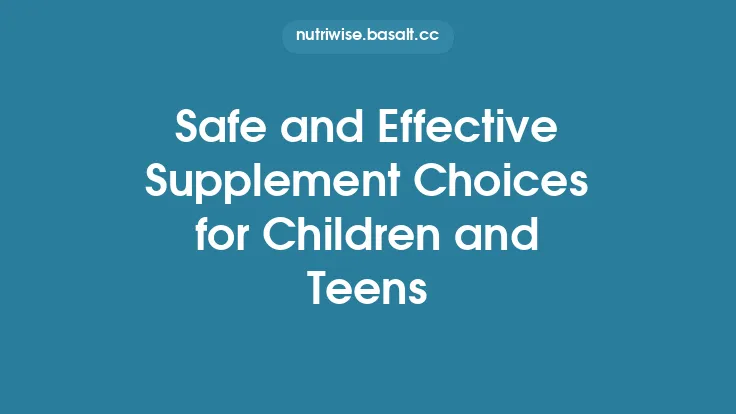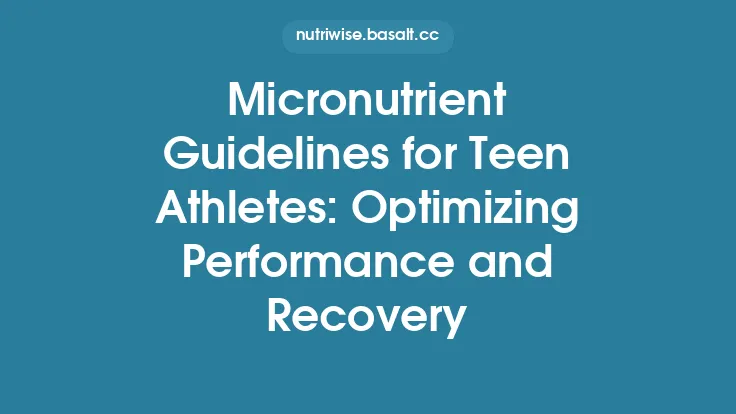Adopting a vegan or vegetarian lifestyle offers countless benefits—from reduced environmental impact to a diet rich in fiber, phytonutrients, and antioxidants. Yet, even the most thoughtfully planned plant‑based meals can fall short on a few nutrients that are either less abundant in plant foods or less bioavailable when they do appear. Bridging these gaps with targeted supplementation helps ensure optimal health, supports long‑term vitality, and allows you to reap the full rewards of a plant‑focused diet.
Key Nutrients of Concern for Plant‑Based Diets
While a varied, whole‑food plant‑based diet can meet most macro‑ and micronutrient needs, several nutrients consistently emerge as “watch points” for vegans and vegetarians:
| Nutrient | Primary Plant Sources | Typical Bioavailability | Common Gap Reason |
|---|---|---|---|
| Vitamin B12 | Fortified foods, nutritional yeast | Low (requires animal‑derived cobalamin) | Not naturally present in plants |
| Iron (non‑heme) | Legumes, tofu, dark leafy greens, seeds | Moderate to low (inhibited by phytates) | Competes with calcium and polyphenols |
| Zinc | Whole grains, legumes, nuts, seeds | Moderate (phytate binding) | Similar to iron, phytates reduce absorption |
| Calcium | Fortified plant milks, tofu (calcium‑set), kale, bok choy | Good (especially from low‑oxalate greens) | Lower intake of dairy |
| Vitamin D | Sunlight, fortified foods, mushrooms (UV‑exposed) | Variable (depends on sun exposure) | Limited natural sources |
| Omega‑3 (EPA/DHA) | Algal oil, walnuts, flaxseed, chia | ALA from plants converts poorly to EPA/DHA | Conversion rate <5% |
| Iodine | Seaweed (kelp, nori), iodized salt | Variable (depends on seaweed type) | Inconsistent intake |
| Selenium | Brazil nuts, whole grains, legumes | Good (soil dependent) | Soil selenium levels vary regionally |
| Vitamin K2 (menaquinone) | Natto, fermented soy, some cheeses (non‑vegan) | Low in typical vegan diets | Mostly found in animal products |
| Choline | Soybeans, quinoa, broccoli, cauliflower | Moderate | Often overlooked in diet planning |
Understanding why these gaps occur guides the selection of appropriate supplements and dietary strategies.
Vitamin B12: The Cornerstone of Vegan Supplementation
Why it matters
Vitamin B12 is essential for red blood cell formation, neurological function, and DNA synthesis. Deficiency can lead to anemia, neuropathy, and cognitive disturbances—issues that can develop silently over years.
Forms and efficacy
- Cyanocobalamin – the most common, stable, and cost‑effective form. Adequate for most adults when taken in appropriate doses.
- Methylcobalamin – a bioactive form that some prefer for its direct involvement in methylation pathways.
- Hydroxocobalamin – longer circulating half‑life; often used in injectable preparations.
Dosage guidelines
- Daily low‑dose: 25–100 µg/day of cyanocobalamin or methylcobalamin.
- Weekly high‑dose: 2,000–5,000 µg once per week, suitable for those who prefer fewer pills.
- Sublingual tablets or lozenges: Offer comparable absorption to oral tablets when taken on an empty stomach.
Testing and monitoring
Serum B12, methylmalonic acid (MMA), and homocysteine are the most reliable markers. Aim for serum B12 > 350 pg/mL; elevated MMA or homocysteine suggests functional deficiency even if serum B12 appears normal.
Iron and Zinc: Enhancing Absorption
Iron
- Supplement type: Ferrous bisglycinate or iron glycinate chelate is gentler on the stomach than ferrous sulfate and offers better absorption.
- Dosage: 8–18 mg elemental iron daily for most adults; higher doses (30–45 mg) may be needed for those with documented deficiency.
- Timing: Take on an empty stomach with vitamin C (e.g., a small orange juice) to boost absorption; avoid calcium‑rich foods or supplements within two hours.
Zinc
- Supplement type: Zinc picolinate or zinc citrate provide high bioavailability.
- Dosage: 8–11 mg/day for adult women, 11–15 mg/day for adult men. Higher therapeutic doses (30 mg) can be used short‑term under professional guidance.
- Timing: Best taken with meals to reduce gastrointestinal upset; avoid high‑phytate foods (e.g., whole grains) at the same time.
Synergy and antagonism
Iron and zinc compete for the same transporters. If you need both, stagger intake (e.g., iron in the morning, zinc in the evening) to maximize absorption.
Calcium and Vitamin D: Bone Health Foundations
Calcium
- Supplement options: Calcium citrate is well absorbed (≈40% even without stomach acid) and less likely to cause constipation than calcium carbonate.
- Dosage: 500–600 mg per dose, split into two daily servings to stay under the 1,000 mg threshold where absorption efficiency drops.
- Considerations: Pair with vitamin D for optimal utilization; avoid taking with high‑oxalate foods (spinach, beet greens) that can bind calcium.
Vitamin D
- Forms: Vitamin D3 (cholecalciferol) derived from lichen is vegan‑friendly; D2 (ergocalciferol) is plant‑based but slightly less potent.
- Dosage: 1,000–2,000 IU/day for most adults with limited sun exposure; up to 4,000 IU/day is safe for many, but testing serum 25‑OH‑D is advisable.
- Testing: Aim for 25‑OH‑D levels of 30–50 ng/mL. Levels below 20 ng/mL indicate deficiency.
Omega‑3 Fatty Acids: DHA/EPA for Brain and Heart
Why EPA/DHA matter
Alpha‑linolenic acid (ALA) from flaxseed, chia, and walnuts converts to EPA and DHA at rates of 5–10% and <1% respectively—insufficient for optimal neuro‑cardiovascular health.
Supplement source
- Algal oil: Directly provides DHA (often 200–300 mg per capsule) and EPA (100–150 mg). It’s the only truly vegan source of pre‑formed long‑chain omega‑3s.
- Dosage: 250–500 mg combined DHA/EPA daily for general health; higher doses (up to 1,000 mg) may be considered for specific cardiovascular or cognitive goals.
Quality markers
- Look for certifications such as “certified vegan” and “third‑party tested for contaminants (e.g., heavy metals, PCBs).”
- Verify the EPA:DHA ratio aligns with your health focus (e.g., higher DHA for brain support).
Iodine and Selenium: Thyroid and Antioxidant Support
Iodine
- Sources: Kelp tablets (standardized to 150 µg iodine per serving) or iodized salt (150 µg per gram).
- Dosage: 150 µg/day (RDA) for adults; avoid excess (>1,100 µg) to prevent thyroid dysfunction.
- Tip: If you regularly consume seaweed, monitor intake because some varieties (e.g., kombu) can deliver several milligrams per serving.
Selenium
- Sources: Brazil nut supplement (one nut provides ~68 µg) or selenomethionine capsules.
- Dosage: 55 µg/day (RDA); 200 µg/day is the upper safe limit.
- Note: Selenium status is heavily dependent on soil content; testing serum selenium can guide supplementation.
Protein and Essential Amino Acids: Complementing Plant Proteins
Complete protein strategy
While most plant foods lack one or two essential amino acids, combining complementary sources (e.g., beans + rice, hummus + whole‑grain pita) across the day provides a full amino acid profile.
Supplement options
- Pea‑protein isolate: High in lysine, low in methionine; blends well with rice protein.
- Soy‑protein isolate: Naturally complete, but some prefer to limit soy for personal reasons.
- Branched‑Chain Amino Acids (BCAAs): If you engage in intense resistance training, a BCAA supplement (leucine, isoleucine, valine) derived from fermented plant sources can aid recovery.
Dosage
- Aim for 0.8–1.2 g protein per kilogram body weight daily; athletes may target 1.4–2.0 g/kg.
- A typical serving of 20–30 g plant protein powder fits comfortably within these ranges.
Vitamin K2 and Other Emerging Nutrients
Vitamin K2 (Menaquinone‑7)
- Why it matters: K2 directs calcium to bones and teeth while preventing arterial calcification.
- Vegan source: Natto (fermented soy) is the richest plant source; however, many avoid its strong flavor.
- Supplement: MK‑7 derived from natto fermentation (often labeled “vegan MK‑7”).
- Dosage: 90–120 µg/day for adults.
Other nutrients gaining attention
- Choline: Important for liver function and brain health. Vegan supplement options include choline bitartrate or phosphatidylcholine from soy lecithin. 425 mg/day (women) / 550 mg/day (men) is the AI.
- Beta‑alanine: For those seeking improved muscular endurance, plant‑based beta‑alanine (derived from fermentation) can be considered.
- Adaptogenic blends: Ashwagandha, rhodiola, and holy basil extracts are increasingly used to support stress resilience; ensure they are certified vegan and free of hidden animal‑derived excipients.
Practical Tips for Choosing High‑Quality Supplements
- Verify vegan certification – Look for logos from reputable organizations (e.g., Vegan Society, Certified Vegan).
- Check for third‑party testing – NSF, USP, or Informed‑Sport certifications confirm purity and label accuracy.
- Read the ingredient list – Avoid hidden animal derivatives such as gelatin, shellac, or certain “natural flavors.”
- Consider the delivery form – Capsules (often cellulose‑based), tablets, powders, or sublingual lozenges each have pros and cons regarding absorption and convenience.
- Mind the dosage – More isn’t always better. Stick to recommended daily allowances unless a healthcare professional advises otherwise.
- Store properly – Some nutrients (e.g., omega‑3s, vitamin D) degrade with heat and light; keep them in a cool, dark place.
Integrating Supplements into a Balanced Plant‑Based Lifestyle
- Start with a food audit: Track a week of meals to identify which of the key nutrients are consistently low.
- Prioritize whole foods: Supplements should fill gaps, not replace diverse, nutrient‑dense meals.
- Schedule strategically: Pair iron with vitamin C, take calcium and vitamin D together, separate zinc from iron, and space B12 doses away from high‑fiber meals if you notice absorption issues.
- Monitor and adjust: Periodic blood work (B12, ferritin, 25‑OH‑D, iodine, selenium) helps fine‑tune your regimen.
- Stay hydrated and maintain gut health: A healthy microbiome improves mineral absorption; include fermented foods (kimchi, sauerkraut, kombucha) and prebiotic fibers (onion, garlic, asparagus).
By thoughtfully selecting and timing a concise set of vegan‑friendly supplements, you can confidently bridge the most common nutrient gaps inherent to plant‑based eating. This approach not only safeguards your short‑term wellbeing but also builds a resilient foundation for long‑term health, allowing you to thrive on a compassionate, sustainable diet.
